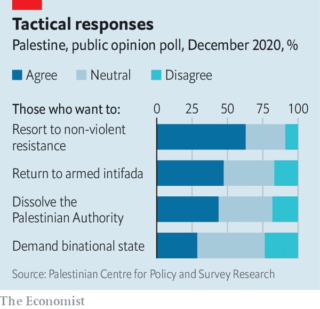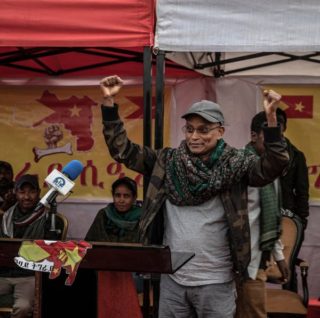Will the first polls in 15 years shake things up in the Holy Land?
MOST PALESTINIANS are probably too young to remember when their president, Mahmoud Abbas, took power in 2005. He was elected to a four-year term, the first of two permitted by law. He never got round to holding another vote, yet he remains in charge, having served four times his mandate. Amazingly, he could soon win another term.
On January 15th Mr Abbas announced the first elections in the occupied territories in more than 15 years. Many Palestinians were understandably sceptical. Calling for new elections is something of an annual tradition for Mr Abbas, who turned 85 in November. They never happen. Increasingly autocratic, Mr Abbas is loth to risk his grip on power.
Perhaps he is more serious this time. Against the grain of years past, he has fixed dates for the elections, with a parliamentary ballot in May and a presidential one in July. But even if they happen they are unlikely to bring sweeping change: Mr Abbas could be the only viable candidate for president. His announcement does not reflect a desire for fresh faces or a new direction.
Instead, it is a gesture to the new president in Washington. The Palestinians had a hard time with Donald Trump, to say the least; relations with America have not been this bad since the 1980s. Mr Abbas is eager to start anew with Joe Biden. Yet he is likely to be disappointed with the new administration, which has neither the time nor the inclination to wander down the cul-de-sac of Israeli-Palestinian diplomacy. In his effort to court the Americans, Mr Abbas may simply illustrate how bereft of ideas he is.
Three out of four Palestinians support his call for elections. But they are not terribly enthusiastic about their choices. A survey conducted in December by Palestine’s leading pollster found that 66% of the public want Mr Abbas to resign. He would probably lose a race against Ismail Haniyeh, the leader of Hamas, the militant Islamist group that controls Gaza. It may not field a candidate, though. The group’s experiment with governance has been a disaster. Under blockade by Israel and Egypt, Gaza is an open-air prison where 2m people live in miserable conditions. Better to have Mr Abbas as a foil than to be responsible for the West Bank as well.
There are few other credible challengers for the throne. Despite his advanced age, Mr Abbas has not designated a successor, and occasionally cuts down rivals within his nationalist Fatah party. The only name that excites voters is Marwan Barghouti, a prominent member of Fatah who would probably romp home to victory. But he would have to run from inside a jail cell. Mr Barghouti was convicted of murder by an Israeli court for organising attacks during the second intifada, or Palestinian uprising, and is serving multiple life sentences.
As for parliament, it has been defunct for more than a decade, owing to a dispute between Hamas and Fatah. Asked who they would choose in a legislative election, 34% of Palestinians said Hamas and 38% Fatah (in the election of 2006 they won 44% and 41% of the vote, respectively). The rest opted for third parties or were undecided. A good showing could give Hamas a foothold in the West Bank, where both Israel and the Palestinian Authority (PA) have long worked to suppress it. Many of the president’s own lieutenants are therefore opposed to holding elections now. The decision is an uncharacteristic risk for the stuffy Mr Abbas, one he hopes will leave him with a renewed mandate and a smidgen of goodwill in Washington.
It is hard to remember now, but his relationship with Mr Trump began amicably. After their first meeting at the White House, in May 2017, Mr Abbas declared “with you, we have hope.” But there was an irreparable break in December of that year, when Mr Trump recognised Jerusalem as Israel’s capital and moved America’s embassy there, breaking with decades of bipartisan consensus that it should remain in Tel Aviv. For the Palestinians, the status of Jerusalem should be resolved in a final peace agreement. They saw Mr Trump’s move as an effort to prejudge the outcome.
Things went from bad to worse. In 2018 Mr Trump set out to halt all American aid to the Palestinians, including funds for the United Nations agency that supports Palestinian refugees and for the Palestinian security forces that America helped train and equip. He also closed the Palestinian diplomatic mission in Washington. In 2020 he released a “peace plan” seen as hopelessly biased: it allowed Israel to keep about a quarter of the occupied West Bank.
Last year Mr Abbas compounded his problems. Buoyed by Mr Trump’s plan, the Israeli prime minister, Binyamin Netanyahu, contemplated annexing parts of the West Bank. In protest, Mr Abbas stopped accepting transfers of tax revenue that Israel collects on the pa’s behalf. That cash covers 60% of the authority’s budget. Without it, many workers went unpaid or received only half their salaries. Some accepted this as a sacrifice for the greater good.
In August, however, it became a needless sacrifice. Israel suspended talk of annexation in return for diplomatic ties with the United Arab Emirates, a decision that could bring economic dividends as well. Mr Abbas, like many Palestinians, saw the Emirati move as a betrayal. He was unwilling to reverse his decision on the tax revenue without some diplomatic victory of his own. By the time he relented, in November, the Palestinian economy had suffered. Almost one in six Palestinians in the West Bank works for the government, in jobs that tend to pay better than the private sector. The unemployment rate in the West Bank rose from 13% in the third quarter of 2019 to 19% a year later.
No surprise, then, that the Biden administration seems a breath of fresh air. The new president has already promised to renew aid to the Palestinians and restore diplomatic ties. Yet some of the hope in him is misplaced. For a start, Mr Biden will not reverse all his predecessor’s policies, as Tony Blinken, his secretary of state, made clear at his confirmation hearing. Asked if the administration recognised Jerusalem as Israel’s capital and planned to keep America’s embassy there, he gave a succinct answer: “yes and yes”.
Nor is the new president a miracle worker. He cannot end the schism between Palestinians nor reverse the hawkish tilt in Israeli politics. America has spent three decades trying to broker a deal between Israel and the Palestinians; well-intentioned presidents working in better circumstances have failed. Mr Biden’s inbox is filled to overflowing and his political capital is limited. The moribund peace process is unlikely to be a priority.
Even many Palestinians would think it a wasted effort. Just 2% believe there is a good chance of securing their own state in the next five years. Most expect to be stuck with the status quo. They have differing ideas about how to break the impasse with Israel (see chart). A solid majority, 63%, backs a campaign of non-violent resistance. Pluralities agree with armed struggle (48%) and dissolving the pa (44%), while 29% support abandoning the two-state solution and pushing for a binational state that Arabs and Jews would share between the Mediterranean and the Jordan river.
One can debate the merits of each path. Calls for a one-state solution would meet broad opposition in Israel. Even in the most amoral assessment, the violence of the second intifada was a strategic mistake, one that hardened public opinion against Palestinians both in Israel and overseas. These debates are common in the territories, in cafés, at conferences on social media—everywhere, it seems, but in the halls of power. Mr Abbas may win another four years in office. But he has nothing to offer except the same ideas that led nowhere over the previous sixteen.
By The Economist






